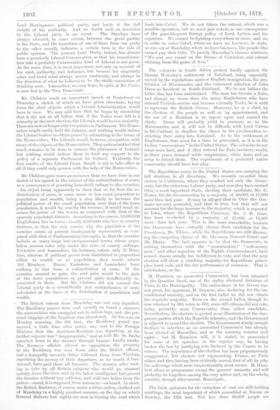• The British retreat from Mandalay was not very dignified.
The Residency papers were Rent secretly on board a steamer, the ammunition was smuggled out in ration-bags, and the per- sonal baggage of the Legation was abandoned. At five a.m. on Monday morning, the 6th inst., the Residency guard was warned, a little time after notice was sent to the Foreign Minister that the Assistant-Resident was departing, as his farther sojourn was "inappropriate," and at 6.30 Mr. St. l3arbe marched down to the steamer through bazaars hardly awake. The Burmese officials offered no opposition, the property in the Residency was sent down after the British officers, and a tranquilly sarcastic letter followed them from Theebau, regretting the secrecy of their departure, as he would, if fore- warned, have paid them all honours. The steamer, after wait- ing to take up all British subjects who would go, steamed quietly down the river, and by the latest intelligence had passed the frontier without any collision, and with two ladies from the palace—saved, it is supposed, from massacre—on board. In short, the British Embassy, of course under written orders, skulked out of Mandalay in a highly prudent manner, on the day on which General Roberts lost eighty-six men in forcing the road which leads into Cabul. We do not blame the retreat, which was a sensible operation, but we must jest note it, as one consequence of the grandiloquent foreign policy of Lord Lytton and his superiors. We cannot be fighting everywhere at once; and so, in order to enter Cabul, where we have no business, in style, we run out of Mandalay, where we have business, like people who, cannot pay their bills. To parody Macaulay's famous sentence, "We seat our, vassal on the throne of Candahar, and, retreat whining from the gates of Ava."


































 Previous page
Previous page